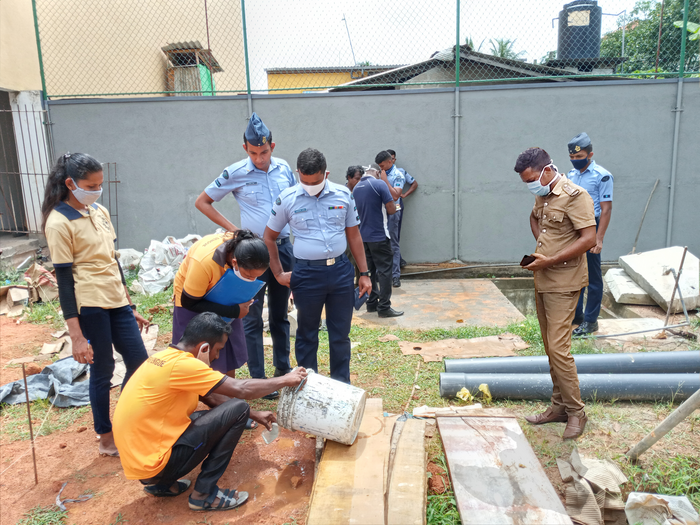Increases in three climate factors—temperature, rainfall, and ocean warming —predicted mosquito population growth in Sri Lanka for the next one to six months, according to a new study by an international team of researchers. The findings, published in The Lancet Planetary Health, can inform the design and timing of programs to limit the spread of mosquito-borne diseases like dengue.

Credit: Mr. Gayan Liyanage
Increases in three climate factors—temperature, rainfall, and ocean warming —predicted mosquito population growth in Sri Lanka for the next one to six months, according to a new study by an international team of researchers. The findings, published in The Lancet Planetary Health, can inform the design and timing of programs to limit the spread of mosquito-borne diseases like dengue.
Nearly half of the world’s population lives in areas at risk for dengue, which has become a major public health problem in Sri Lanka. Because developing a safe and effective vaccine against dengue has proven to be difficult, controlling mosquito populations is considered to be the most effective strategy to prevent the virus’s spread.
Dengue transmission patterns in Sri Lanka closely follow the country’s monsoonal rainfalls, with peak transmission in July following the southwest monsoon, followed by a smaller peak in December to January after the northeast monsoon. Research shows a relationship between some climate variables and the quantity, feeding patterns, and lifespan of Aedes mosquitoes, which transmit dengue, but the relationship between Aedes mosquito activity and climate is still not well understood.
“Dengue transmission is expected to intensify due to climate change. If we can use climate and weather data to predict seasonal patterns of mosquitos, this timely information would allow public health authorities to proactively manage mosquito control operations,” said study author Yesim Tozan, assistant professor of global health at NYU School of Global Public Health.
The researchers aimed to quantify the effect of climate on Aedes mosquitoes in Kalutara, a district in southwestern Sri Lanka with a persistent, high presence of dengue. They measured three monthly weather variables—rainfall, temperature, and Oceanic Niño Index—from 2010 to 2018. The Oceanic Niño Index measures whether waters in the tropical Pacific Ocean are warmer or cooler than average, with El Niño and La Niña phases triggering changes in weather. Three El Niño events, or unusually warm ocean temperatures, occurred from 2010 to 2018.
The researchers then compared the climate variables with systematically collected surveillance data of mosquitoes in Kalutara, including measurements of Aedes mosquitoes and larvae found in homes and outdoor water containers.
All three climate variables predicted mosquito activity, but with different time lags. More rainfall—which often led to outdoor containers filling with water, creating mosquito breeding sites—predicted a greater prevalence of mosquitoes within the same month. Hotter temperatures were associated with increases in mosquitoes one to two months later. The warmer ocean temperatures of El Niño events predicted increases in mosquitoes with a five to six months delay.
“These climate factors have the potential to serve as predictors of mosquito activity at different times and may enable us to quantify the risk and implement effective mosquito control interventions before a dengue epidemic emerges,” said the study’s lead author Prasad Liyanage of the Sri Lanka Ministry of Health and Umeå University in Sweden, who will join NYU School of Global Public Health this fall as a postdoctoral associate.
“Tracking El Niño events has the added advantage of predicting the seasonal prevalence of Aedes mosquitoes with a lead time of six months, which could provide opportunities to issue early warnings on mosquito prevalence for the entire dengue season,” added Tozan.
Additional study authors include Hans Overgaard of the Norwegian University of Life Sciences and Khon Kaen University in Thailand, Hasitha Aravinda Tissera of the Sri Lanka Ministry of Health, and Joacim Rocklöv of Umeå University and Heidelberg University in Germany.
About the NYU School of Global Public Health
At the NYU School of Global Public Health (NYU GPH), we are preparing the next generation of public health pioneers with the critical thinking skills, acumen, and entrepreneurial approaches necessary to reinvent the public health paradigm. Devoted to employing a nontraditional, interdisciplinary model, NYU GPH aims to improve health worldwide through a unique blend of global public health studies, research, and practice. The School is located in the heart of New York City and extends to NYU’s global network on six continents. Innovation is at the core of our ambitious approach, thinking and teaching. For more, visit: http://publichealth.nyu.edu/
Journal
The Lancet Planetary Health
Subject of Research
Not applicable
Article Title
Effect of El Niño–Southern Oscillation and local weather on Aedes vector activity from 2010 to 2018 in Kalutara district, Sri Lanka: a two-stage hierarchical analysis
Article Publication Date
6-Jul-2022




